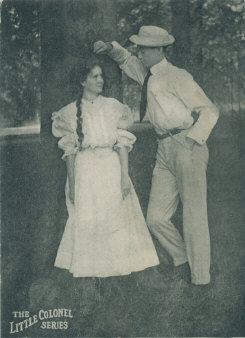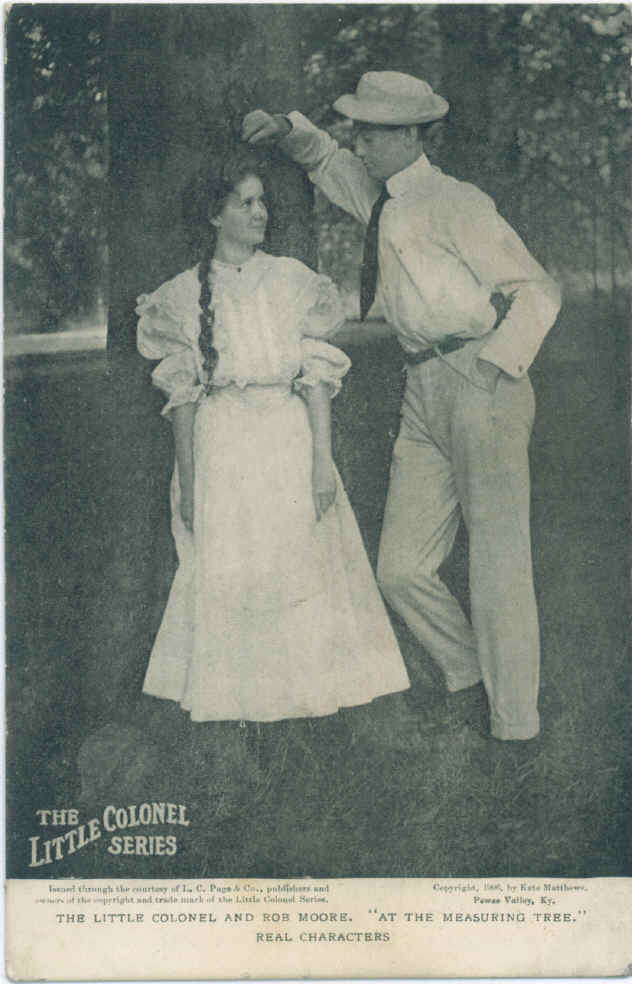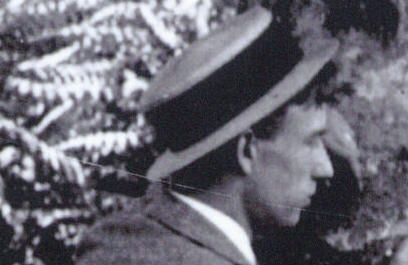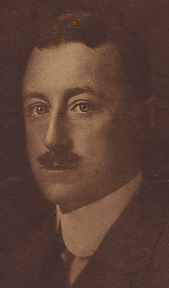Muir Semple
“Rob Moore”
A real-life model in Annie Fellows Johnston’s “Little Colonel” series

The Little Colonel and Rob Moore
“At the Measuring Tree”
Real Characters
Kate Matthews, 1906.
(click picture for more)
early 20th C post card, photo by Kate Matthews
The Little Colonel and Rob Moore
“At the Measuring Tree”
Real Characters
Kate Matthews, 1906.

None of the later Little Colonel books would be complete without a visit to the Measuring Tree at the end of each summer season. Here, the Little Colonel and Rob would part until the next summer (or the next book). The Measuring Tree was on the avenue leading to The Locust.



More pictures of Rob and the Measuring Tree
Click to enlarge
Muir Semple
(June 4, 1887 – Feb 18, 1952)

Muir Semple was one of the real Little Colonel’s closest childhood friends, and became Annie Fellows Johnston’s model for Rob “Bobby” Moore in the Little Colonel series. He appears for the first time in Chapter I of The Little Colonel’s House Party, the fourth book in the series, published in 1900:
Under the blossoms rode the Little Colonel, all in white herself this May morning, except the little Napoleon hat of black velvet, set jauntily over her short light hair. Into the cockade she had stuck a spray of locust blossoms, and as she rode slowly along she fastened a bunch of them behind each ear of her pony, whose coat was as soft and black as the velvet of her hat. “Tarbaby” she called him, partly because he was so black, and partly because that was the name of her favourite Uncle Remus Story.
“There!” she exclaimed, when the flowers were fastened to her satisfaction. ” Yo’ lookin’ mighty fine this mawnin’, Tarbaby! Maybe I’ll take you visitin’ aftah I’ve been to the post-office and mailed these lettahs. You didn’t know that judge Moore’s place is open for the summah, did you, and that all the family came out yesta’day ? Well, they did, and if Bobby Moore isn’t ovah to my house by the time we get back home, we’ll go ovah to Bobby’s.”
As she spoke, she passed through the gate at the end of the avenue and turned into the public road, a wide pike with a railroad track on one side of it and a bridle-path on the other. Two minutes’ brisk canter brought her to another gate, one that had been closed all winter, and one that she was greatly interested in, because it led to judge Moore’s house. Judge Moore was Rob’s grandfather, and she and Rob had played together every summer since she could remember.
The wide white gate was standing open now, and she drew rein, peering anxiously in. She hoped for the sight of a familiar freckled face or the sound of a welcoming whoop…
…She was turning slowly away when down the pike behind her came the quick beat of a horse’s hoofs and a shrill whistle. A twelve-year-old boy was riding toward her as fast as his big gray horse could carry him. He was riding bareback, straight and lithe as a young Indian, his cap pushed to the back of his head. He snatched it off with a flourish as he came within speaking distance of the Little Colonel, his freckled face all ashine with pleasure.
“Hello! Lloyd,” he called, “I was just going to your house.”
“And I was looking for you, Bobby,” she answered, as informally as if it were only yesterday they had parted, instead of eight months before.
“Come and go down to the post-office with me. I must take these lettahs.”
“All right,” said Rob, wheeling the gray horse around beside the black pony, and smiling broadly as he looked down into the Little Colonel’s welcoming eyes. “You don’t know how good it feels to get back to the country again, Lloyd. I could hardly wait for school to close, when I’d think about the fish waiting for me out here in the creek, and the wild strawberries getting ripe, and the horses just spoiling to be exercised. It was more than I could stand. What have you been doing all winter?”
“Oh, the same old things: school and music lessons, and good times in the evenin’ with mothah and papa Jack and grandfathah.”
As they jogged along, side by side, the Little Colonel chatting gaily of all that had happened since their last meeting, Rob kept casting curious glances at her. “What have you been doing to yourself, Lloyd Sherman?” he demanded, finally. “You look so — so different!” There was such a puzzled expression in his sharp gray eyes that the Little Colonel laughed. Then her hand flew up to her head.
“Don’t you see? I’ve had my hair cut. I had to beg and beg befo’ mothah and papa Jack would let me have it done; but it was so long, — away below my waist, — and such a bothah. It had to be brushed and plaited a dozen times a day.”
“I don’t like it that way. It isn’t a bit becoming,” said Rob, with the frankness of old comradeship. “You look like a boy. Why, it is as short as mine.”
“I don’t care,” answered Lloyd, her eyes flashing dangerously. “It’s comfortable this way, and grandfathah likes it. He says he’s got his Little Colonel back again now, and he sent to town for this Napoleon hat like the ones I used to weah when I was a little thing.”
“When you were a little thing!” laughed Rob, teasingly. “What do you think you are now, missy? You’re head and shoulders shorter than I am.”
“I’m eleven yeahs old, anyway, I’d have you to undahstand, Bobby Moore,” answered the Little Colonel, with such dignity that Rob wished he hadn’t spoken. “I was eleven last week. That was one of my birthday presents, havin’ my own way about cuttin’ my hair, and anothah was the house pahty. Oh, you don’t know anything about the house pahty I’m to have in June, do you!” she cried, every trace of displeasure vanishing at the thought. “Grandfathah and papa Jack are goin’ away fo’ amonth to some mineral springs in Va’ginia, and I’m to have my house pahty in June to keep mothah and me from bein’ lonesome. It will not be a very big one, only three girls to spend June with me, but mothah says we can have picnics every day if we want to, and invite all the boys and girls in the Valley, and we can have the house full from mawnin’ till night. I’ll invite you right now for every day that you want to come. We’ll expect you at all the pahties and picnics and candy-pullin’s that we have. I want you to help me give the girls a good time, Bobby.”
The climax of the Little Colonel series comes in The Little Colonel’s Knight Comes Riding, when anxious readers around the world finally found out whether or not Rob Moore wins the Little Colonel’s hand, and if they live happily ever after at Oaklea. We’ll try not to spoil it for you, but we can tell you that the the Little Colonel will get married at Lloydsboro Valley’s little stone church.
Later in life:

Mr. Muir Semple of Anchorage
“Bob Moore”
Photo by Standiford from
The Sunday Herald Post
Louisville, Kentucky
December 23, 1928
(From the Samuel Culbertson Mansion Collection)
Unfortunately, in real life, Muir Semple did not enjoy a “happily ever after,” according to his obituary published in the February 19, 1952 issue of the “Courier-Journal”:
Muir Semple Ends Own Life In Anchorage
‘Little Colonel’ Books Used Him as Character
Muir Semple, member of a prominent Louisville family, was found dead at 2:45 a.m. yesterday in the basement of his home on Hazelwood Road, Anchorage.
Chief Deputy Coroner Willima Kammerer said Semple committed suicide by shooting himself in the head with a .22-caliber riflle.
The body was found by his wife, Mrs. Ethel Semple. She said her husband threatened to shoot himself shortly before she heard the shot. He had been in ill health, Mrs. Semple said.
One of the characters of the “Little Colonel” fiction series was based on Semple’s younger life. Mrs. Annie Fellows Johnston, the author of the series, was a friend of Semple’s family.
He was in the automobile business until 18 years ago. He was a woodwork hobbyist and worked for the Mengel Company for a time during World War II when the company was making wooden aircraft fuselages.
Semple, 64, was the grandson of Judge Peter B. Muir, a circuit judge here before 1900. He was a member of Owl Creek Country Club, Wynn Stay Club and St. Luke’s Episcopal Church
Muir Semple is buried beside his wife, Ethel Davis Semple, at Cave Hill Cemetery
Page by Donna Russell